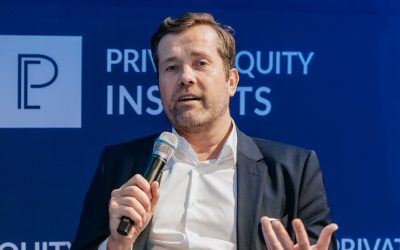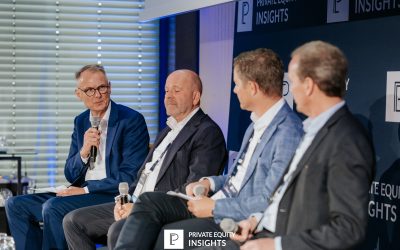Spencer Dinwiddie is a rising star in the NBA, a silky-smooth guard averaging more than 20 points per game this season for the Brooklyn Nets. Yet that statement only scratches the surface. Dinwiddie is also a blockchain pioneer. He is an entrepreneur. An investor. A geek. He is a 27-year-old who dreams of bridging the gap between sports and venture capital in a way that’s never been done before.
But maybe that’s getting too complicated. Maybe the statement that best sums up Dinwiddie comes from the bio on his Twitter page:
Just a tech guy with a jumper.
“Don’t get me wrong, it’s definitely a little tongue-in-cheek,” Dinwiddie said of the sly self-description, in a conversation in April while the NBA was on a hiatus caused by the coronavirus. The league is set to resume play at the end of July. “My primary focus on a day-to-day basis is being a great basketball player. … But when I say that, it’s truly because I have a certain passion for tech, and because I understand it. I almost fit in with that community a little more than I do with the NBA.”
As the VC industry boomed during the 2010s, more professional athletes began venturing into Silicon Valley. These days, everyone from Aaron Rodgers to Serena Williams has their own firm.
Last year, after nearly a decade of biding his time, Dinwiddie got in on the act, teaming with longtime friend and business partner Sherrard Harrington to create Eonxi, a venture firm and startup studio that aims to transform the way athletes and other influencers market themselves. The firm’s thesis of star empowerment was exemplified earlier this year, when Dinwiddie put on the market blockchain-based tokens for a share of his $34.4 million NBA contract, essentially allowing accredited investors to buy stakes in his success.
More recently, as protests have swept the globe and the venture industry has reckoned with its history of inequality, that idea of empowerment has taken on added meaning. As their firm gets up and running, Dinwiddie and Harrington are discussing how best to use their platform to support fellow Black founders and investors, and other groups that have historically been sidelined in VC.
It’s what Dinwiddie and Harrington have dreamed of doing ever since their paths first crossed. And if it all works out, the rest of the world might start seeing the multifaceted Dinwiddie the same way he sees himself.
In 2011, Dinwiddie was a touted high-school basketball player from Los Angeles, and Harrington was a promising football prospect from Washington. Both decided to pursue the next phase of their lives far from home: at the University of Colorado, Boulder.
The two clicked from the moment they met. For both, the experience of being courted by colleges during the recruitment process was a wake-up call about the power they possessed as athletes. They bonded over shared interests in tech, entrepreneurship and the idea that athletes and other entertainers could be much more than cogs in a machine.
While still in school, Harrington helped create his first startup, Fanzy, a platform for influencer marketing. Dinwiddie was one of the company’s early investors.
“We always spoke on the same page,” Harrington said. “From day one.”
It was also in college that Harrington and Dinwiddie met another figure who has remained a mentor and friend: Jason Mendelson, an adjunct professor at Colorado and a co-founder of Foundry Group, a mainstay of Boulder’s venture scene.
As Harrington remembers it, he had snuck in to sit in on a class about VC finance. Mendelson was the guest speaker. Harrington was intrigued, and afterward he emailed Mendelson: I know I’m not going to be in the NFL, Harrington wrote, and I think I want to be an entrepreneur. I assume the answer is no, but would you be willing to meet?
“And I was like, ‘Of course I’d be willing to meet.’ I love somebody who’s got that moxie,” Mendelson recalled. “And I have followed Sherrard ever since. You know those people who, every time you speak to them, you walk away happier? That is Sherrard.”
While Harrington was starting out in business, Dinwiddie was launching his career in the NBA. It wasn’t always smooth sailing.
He struggled to get on the court after being selected by the Detroit Pistons in the second round of the 2014 NBA draft. But Dinwiddie began to blossom after signing with Brooklyn in 2016: He has increased his scoring average every season of his career, from 4.3 points per game as a rookie to 20.6 per game this season before the league suspended play.
Throughout his ascent, Dinwiddie’s ambitions in tech bubbled just below the surface. But the politics and pressures of the NBA made it difficult to pursue both paths. It was only late in 2018, when he signed his current three-year contract in Brooklyn, that Dinwiddie felt established enough as a basketball player to truly open up about his other aims.
“In the basketball space, one of the things you can’t appear to be is non-focused,” he said. “Because I was a minimum player for the first four-and-a-half years of my career, you have to be focused, be the workman, be that guy, you know what I mean?
“You can’t just go full bore, because you would seem to be, quote-unquote, distracting from the goal of winning. Once you solidify yourself and get to the second, third contract and have a high level of production, now when I speak about these things, it’s not seen as a distraction. Because I’ve already proven myself.”
Eonxi has 11 employees spread across a startup studio in Colorado and its venture unit in New York. Both sides of the firm focus on gaming, sports and entertainment. The partners say they intend to capitalize on a growing consensus about the power that influencers can possess.
“When we first joined the influencer ecosystem, a lot of these brands didn’t even know what influencers were,” Harrington said. “Our vision is to be that place where influencers and entertainers can come and get the resources needed to empower what they want to do.”
Dinwiddie and Harrington know they’re part of a very small group of Black VCs with check-writing power, and they want to change that. To attack the problem at its roots, they’re discussing ways to form mentorship programs and partnerships to reach students and young people who are traditionally left out of VC—the sorts of things they themselves never had.
“Growing up in D.C., I never thought of being an entrepreneur, a doctor, a lawyer. Those weren’t things that were discussed in my community,” Harrington said. “These are new avenues for inner-city children. When someone goes to Spencer’s profile, some 13-year-old kid who may not be very good at basketball, they can say, ‘Dang, I can be a tech guy.'”
The most notable example yet of the investors’ ideas for empowerment came last fall, when Dinwiddie made a startling announcement: He planned to put his $34.4 million NBA contract on a blockchain and turn it into a securitized investment as part of a new platform called DREAM Fan Shares, an early product of Eonxi’s startup studio.
It was a complicated plan, but one that ultimately had a simple logic. By selling off stakes in the contract, Dinwiddie could get access to liquidity now that otherwise wouldn’t have been available for years—liquidity that could then go toward other investments. And investors in the token would receive annual dividends, with the guaranteed nature of NBA contracts making it a relatively low-risk proposition.
For Dinwiddie, who was integral in crafting the offering, it would also have the added elegance of streamlining a marketplace he sees as rife with inefficiency.
“People always act as if the NBA is where all the value is really retained, and the current dynamic, they try to make it seem that way,” he said. “But really, they’re brokers within the system. The consumer is purchasing access to the asset, and the asset is the athlete. So the more you can bring the consumer and the asset closer together, the more you bring value to the system.”
Initially, the league objected to the unprecedented idea, but after a few months of back-and-forth, the two sides found common ground. Dinwiddie launched the token in January, and the DREAM Fan Shares platform hopes to conduct similar offerings in the future for other kinds of influencers.
“Everything in life is not necessarily going to make sense,” Dinwiddie said. “But blockchain does.”
In broad brushstrokes, Dinwiddie and Harrington know what they want to accomplish in the coming years. In an era when a star like LeBron James can have his own show HBO and streamers like Tyler “Ninja” Blevins can earn more than $10 million a year, new avenues continue to open for stars and influencers to spread their wings. With a mix of capital and marketing expertise, the two young investors believe their firm can be a conduit for exactly that.
Eonxi’s venture arm is in the process of raising its first fund from outside investors, a $25 million effort, some portion of which will likely be dedicated to startups led by founders of color. During the pandemic shutdown, Dinwiddie and Harrington kept busy negotiating new deals and making hires. Their journey is still just beginning. But Mendelson thinks their unique backgrounds put them in an equally unique position for success.
“I still think there is a ton of bias against people from non-tech industries playing in this,” he said. “The Spencers of the world, who have become experts— and by the way, Spencer’s a better basketball player than I will ever be a venture capitalist—they become incredibly excellent at one thing. And so for some reason that’s a knock against them, that they can’t be excellent at something else? Maybe their ability to be excellent at one thing allows them to be excellent at more than one thing.”
At Eonxi, that’s Dinwiddie’s plan. He is, after all, just a tech guy with a jumper.
Source: Pitchbook
Can’t stop reading? Read more
Exclusive Interview: Torge Barkholtz on rethinking SME succession through operator-led investing
Exclusive Interview: Torge Barkholtz on rethinking SME succession through operator-led investing...
Rightsizing the right way
Rightsizing the right way Rightsizing an organization is never easy. But, it is a normal process...
Mozaik Investments acquires majority stake in Romania’s Genesis College, plans €30m expansion
Mozaik Investments acquires majority stake in Romania’s Genesis College, plans €30m expansion...




